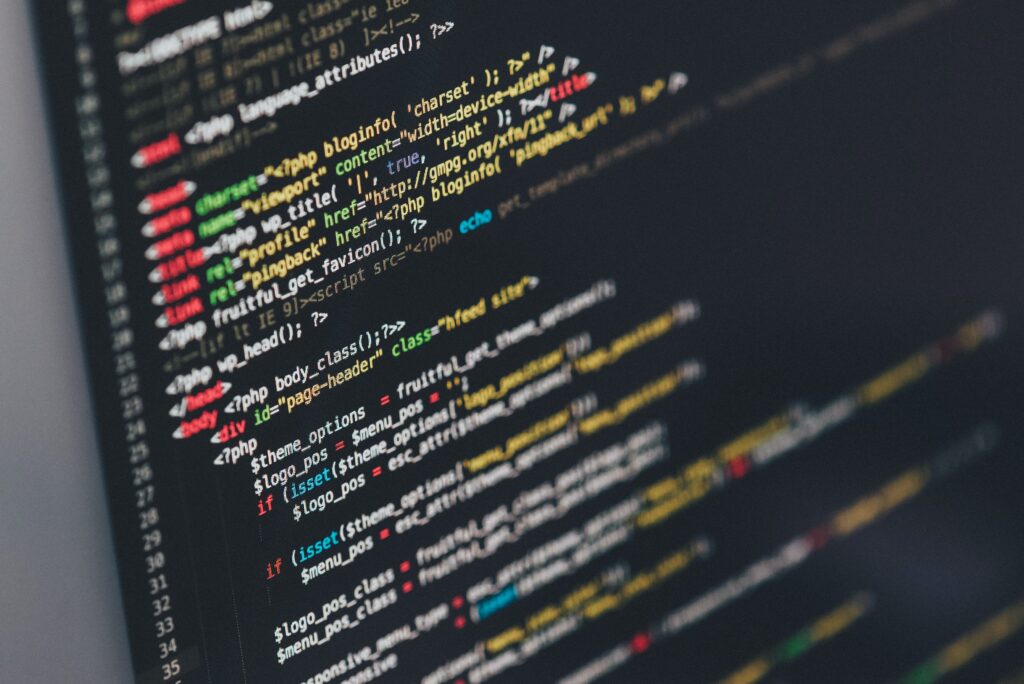
50 Useful Computer Vocabulary Words
Cookies. Clouds. Bugs.
Sounds like a picnic, right?
But if we are talking about computers, these English words have totally different meanings.
English computer words can seem a bit strange to language learners, especially if you think you recognize them… but have no idea what a “bug” is doing inside your laptop.
We will clear up all the confusion in this article.
We have collected a list of the 50 most important English computer terms to know—whether you are looking for a job in technology or just trying to modernize your language skills.
Contents
Download: This blog post is available as a convenient and portable PDF that you can take anywhere. Click here to get a copy. (Download)
Essential English Computer Vocabulary
Below are 50 essential phrases that every English learner should know in order to understand and communicate about the world of computers and technology in the 21st century.
Hardware

Technically, this only refers to a programmable machine. But native English speakers commonly use it to refer to the entire personal computer (PC) device, including a monitor, keyboard, mouse or laptop.
CPUCPU stands for Central Processing Unit. It is the “brain” of a computer that executes instructions and performs calculations.
Hard DriveA storage device that permanently stores data, including the operating system, programs, and files.
HardwareThe hardware are the physical components of a computer, such as the monitor, keyboard, and motherboard (the main circuit board in computers).
KeyboardThe physical board that allows you to type information into a computer.
LaptopA computer device that is easily portable (can be taken from place to place).
MonitorAnother term for a physical computer screen.
MouseThe pointing device used to move the cursor (the position indicator on a computer display screen) and select objects on the computer screen.
PrinterAn output device that produces hard copies of documents and images from a computer. You have likely printed documents from a printer before, although it is becoming less common for people to have a printer in their homes.
RouterA device that allows other devices (such as computers, tablets and phones) to connect to the internet. If your internet connection is not strong enough, you may need to move closer to the router.
ScannerAn input device that captures and digitizes printed documents or images for computer use. You may have used a scanner if, for example, you needed to sign a document and then send it to someone by email.
USBUSB stands for Universal Serial Bus. It is a common interface used to connect devices to a computer, such as printers, keyboards, and external storage.
A USB flash drive , often simply referred to as a “flash drive” or “USB drive,” is a small and portable storage device used for storing and transferring data. It is designed to connect to a computer or other compatible device through a USB port.
Internet and Programming

An algorithm is a set of instructions. Computer programmers design algorithms to make websites, apps or programs perform certain tasks. Social media platforms also use algorithms to manage and personalize the content that users see on their feeds.
BrowserSoftware application used to access and view websites on the internet. There are different kinds of browsers, such as Google Chrome, Safari and Firefox.
Cloud“Cloud-based storage” means that data is stored online. This saves storage space on a computer device. You may have heard someone tell you to save or upload something “to the Cloud.”
Computer programmingThe process of designing, writing and testing sets of instructions (code) that tell a computer how to perform specific tasks or solve problems. This is often referred to as just “programming.”
Cookies“Cookies” refer to small text files that are created and stored on a user’s device when they visit a website. Cookies are used to collect and store certain information about the user’s browsing activity and preferences.
CSSCSS stands for Cascading Style Sheets. This information programs a website’s layout and design. For example, CSS programs a website’s font size and color.
DownloadThis verb refers to retrieving and saving information from the internet onto your device. It can also be used as a noun to refer to information that can be downloaded. For example, you might see a phrase like “Click here to get your free download” on a website.
The opposite of download is upload , which can also be used as a verb (loading something like an image or file onto the internet) or noun (something that has been loaded onto the internet).
EmailElectronic mail sent and received through a computer network. You probably have an email account through a service such as Gmail or Outlook and an email address with an “at sign” (@) and a “dot com” (.com).
EthernetWired networking technology that connects computers and devices through cables.
FirewallA security measure that controls and filters network traffic to protect against unauthorized access and threats. It ensures that only desired and nondestructive content from the internet is allowed to go through.
HTMLHTML stands for Hypertext Markup Language, which provides the information that is displayed on a website. For example, this programs the words that display on a website’s homepage.
InternetThe online network that connects all web-based devices.
IP AddressThe unique code that identifies a device on the internet.
JavaScriptA programming language used to add interactivity and dynamic features to web pages.
KeywordShort phrases that describe an image, idea, webpage or piece of data. For example, the phrases and terms you type into a search engine are considered keywords.
SpamSpam (yes, it was named after the canned meat product) refers to any unwelcome email you receive, usually from advertisers. Basically, this is the junk mail that you did not sign up for and do not want to read.
ToolbarThe toolbar usually sits at the top of your web browser with icons that help you control what you see. Typically, you can find icons that help you move forward, backward or refresh a webpage. You can also type a web address here.
URLThis is the address that brings you to a specific website on the internet. Typically, it starts with www. and ends with .com (or .edu or .gov).
VPNVPN stands for Virtual Private Network. It is a secure connection that encrypts data transmitted over a public network, providing privacy and anonymity.
WebsiteThis is a collection of individual webpages. When you input a URL, you are brought to a website. FluentU is an example of a website. (Its URL is www.fluentu.com.) The program is also an app, and no matter how you access it, it’s a powerful way to study the English language (like the vocabulary in this post) in an immersive and natural way.
FluentU takes authentic videos—like music videos, movie trailers, news and inspiring talks—and turns them into personalized language learning lessons.
You can try FluentU for free for 2 weeks. Check out the website or download the iOS app or Android app.
P.S. Click here to take advantage of our current sale! (Expires at the end of this month.)

Wi-Fi allows computers to communicate wirelessly. Once you connect to a “Wi-Fi network,” you can access the internet without plugging your device into a wire-based system.
Software and Data

An app, or application, is a term that was first popularized by Apple. This refers to computer programs that are commonly seen on smartphones and tablets.
BackupA copy of important data to protect against data loss or damage. “Back up” is the verb form of the term, referring to the action of creating a backup.
Bite/ Byte
The unit of measurement for data. You might see variations like megabyte (1 million bytes) or gigabyte (1 billion bytes). These refer to the amount of data storage available on a device.
BugA bug refers to a computer software problem. This can cause an error message or even lead to a data hack. Usually, you need to run a “debugging” program to remove the issue.
CacheA temporary storage location in a computer’s memory or on a hard drive that stores frequently accessed data to improve system performance.
The browser cache is the temporary storage where a browser keeps copies of web pages and files to speed up future access. You can clear your cache to free up space if you are running low.
DatabaseA structured collection of data organized and stored for easy access, retrieval and management.
EncryptionThe process of converting information into a secret code to prevent unauthorized access.
FileA file is a collection of data or information stored in a computer system under a specific name and location.
Hacking refers to the act of gaining unauthorized access to computer systems, networks or digital devices with the intention of exploiting or manipulating them.
Hackers, also known as cybercriminals, use their technical skills and knowledge to breach security measures and gain unauthorized control or access to sensitive information.
A data hack is an intrusion into a computer system, network or database with the intent of accessing, stealing or manipulating sensitive or confidential data.
MalwareA broad term encompassing malicious (harmful) software such as viruses, ransomware and spyware. Many people have security or antivirus software to protect their computers from malware intrusions.
A virus can replicate and spread, often causing harm to computer systems and data. Ransomware encrypts or blocks access to a victim’s data, rendering it inaccessible or unusable. Spyware is designed to secretly monitor and gather information from a user’s computer or device without their knowledge or consent.
Operating SystemThe software that manages computer hardware and software resources, and provides a user interface (the way by which the user and a computer system interact).
PasswordThe unique string of characters that allows you to access a computer, program or website—and prevents others from accessing your information. For example, you need a password to log into your Facebook account.
RAMRAM stands for Random Access Memory. It is temporary storage space that holds data and instructions being actively used by the CPU.
ScreenshotA screenshot (noun) is a digital picture of the images on a computer or smartphone screen. You can also screenshot (verb) or “take a screenshot,” which simply means creating one of those images.
SoftwareThe virtual information that makes a computer function. This refers to the codes that create computer programs.
SpreadsheetSoftware used to organize, analyze, and manipulate numerical data in a grid format.
ZipZip files are small, compressed files. These files store information with less data than traditional files. When you download a zip file, you need a program to “unzip” the file so you can access the information.
So do not be afraid to start using these computer English terms. You could be on your way to an exciting tech career!
Download: This blog post is available as a convenient and portable PDF that you can take anywhere. Click here to get a copy. (Download)
And One More Thing...
If you like learning English through movies and online media, you should also check out FluentU. FluentU lets you learn English from popular talk shows, catchy music videos and funny commercials, as you can see here:
The FluentU app and website makes it really easy to watch English videos. There are captions that are interactive. That means you can tap on any word to see an image, definition, and useful examples.
For example, when you tap on the word "searching," you see this:
Learn all the vocabulary in any video with quizzes. Swipe left or right to see more examples for the word you’re learning.

FluentU helps you learn fast with useful questions and multiple examples. Learn more.
The best part? FluentU remembers the vocabulary that you’re learning. It gives you extra practice with difficult words—and reminds you when it’s time to review what you’ve learned. You have a truly personalized experience.
Start using the FluentU website on your computer or tablet or, better yet, download the FluentU app from the iTunes or Google Play store. Click here to take advantage of our current sale! (Expires at the end of this month.)











